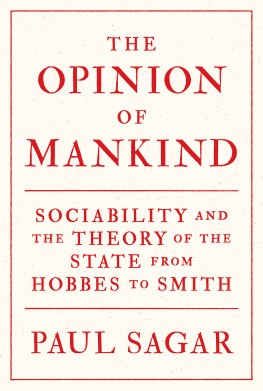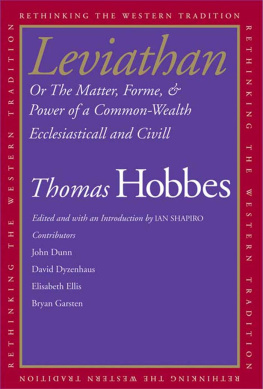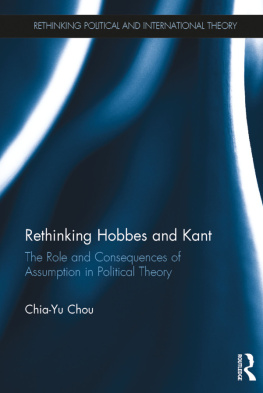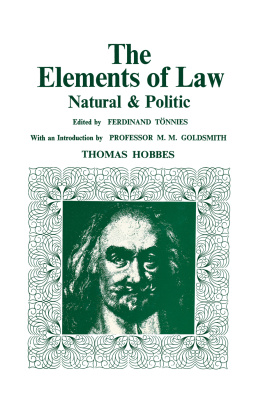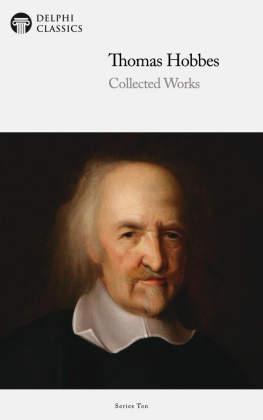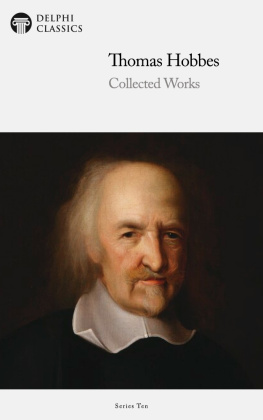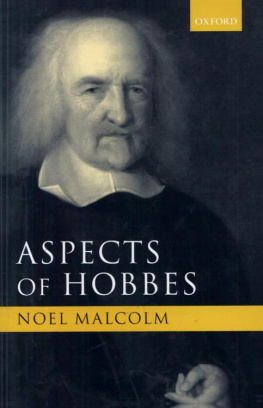Hobbes Thomas - Hobbes and the making of modern political thought
Here you can read online Hobbes Thomas - Hobbes and the making of modern political thought full text of the book (entire story) in english for free. Download pdf and epub, get meaning, cover and reviews about this ebook. year: 2011, publisher: Continuum, genre: Science. Description of the work, (preface) as well as reviews are available. Best literature library LitArk.com created for fans of good reading and offers a wide selection of genres:
Romance novel
Science fiction
Adventure
Detective
Science
History
Home and family
Prose
Art
Politics
Computer
Non-fiction
Religion
Business
Children
Humor
Choose a favorite category and find really read worthwhile books. Enjoy immersion in the world of imagination, feel the emotions of the characters or learn something new for yourself, make an fascinating discovery.

- Book:Hobbes and the making of modern political thought
- Author:
- Publisher:Continuum
- Genre:
- Year:2011
- Rating:4 / 5
- Favourites:Add to favourites
- Your mark:
- 80
- 1
- 2
- 3
- 4
- 5
Hobbes and the making of modern political thought: summary, description and annotation
We offer to read an annotation, description, summary or preface (depends on what the author of the book "Hobbes and the making of modern political thought" wrote himself). If you haven't found the necessary information about the book — write in the comments, we will try to find it.
Hobbes Thomas: author's other books
Who wrote Hobbes and the making of modern political thought? Find out the surname, the name of the author of the book and a list of all author's works by series.
Hobbes and the making of modern political thought — read online for free the complete book (whole text) full work
Below is the text of the book, divided by pages. System saving the place of the last page read, allows you to conveniently read the book "Hobbes and the making of modern political thought" online for free, without having to search again every time where you left off. Put a bookmark, and you can go to the page where you finished reading at any time.
Font size:
Interval:
Bookmark:
Hobbes and the Making of Modern Political Thought
Continuum Studies in British Philosophy
Series Editor: James Fieser, University of Tennessee at Martin, USA
Continuum Studies in British Philosophy is a major monograph series from Continuum. The series features first-class scholarly research monographs across the field of British philosophy. Each work makes a major contribution to the field of philosophical research.
Applying Wittgenstein Rupert Read
Berkeley and Irish Philosophy David Berman
Berkeleys Philosophy of Spirit Talia Bettcher
Bertrand Russell, Language and Linguistic Theory Keith Green
Bertrand Russells Ethics Michael K. Potter
Boyle on Fire William Eaton
The Coherence of Hobbess Leviathan Eric Brandon
Doing Austin Justice Wilfrid Rumble
The Early Wittgenstein on Religion J. Mark Lazenby
F. P. Ramsey edited by Maria J. Frapolli
Francis Bacon and the Limits of Scientific Knowledge Dennis Desroches
Hume on God Timothy S. Yoder
Humes Social Philosophy Christopher Finlay
Humes Theory of Causation Angela Coventry
Idealist Political Philosophy Colin Tyler
Iris Murdochs Ethics Megan Laverty
John Stuart Mills Political Philosophy John Fitzpatrick
Matthew Tindal, Freethinker Stephen Lalor
The Philosophy of Herbert Spencer Michael Taylor
Popper, Objectivity and the Growth of Knowledge John H. Sceski
Rethinking Mills Ethics Colin Heydt
Russell and Wittgenstein on the Nature of Judgement Rosalind Carey
Russells Theory of Perception Sajahan Miah
Thomas Hobbes and the Politics of Natural Philosophy Stephen J. Finn
Thomas Reids Ethics William C. Davis
Wittgenstein and Gadamer Chris Lawn
Wittgenstein and the Theory of Perception Justin Good
Wittgenstein at his Word Duncan Richter
Wittgenstein on Ethical Inquiry Jeremy Wisnewski
Wittgensteins Religious Point of View Tim Labron
Gordon Hull

Continuum International Publishing Group
The Tower Building | 80 Maiden Lane |
11 York Road | Suite 704 |
London SE1 7NX | New York NY 10038 |
www.continuumbooks.com
Gordon Hull 2009
All rights reserved. No part of this publication may be reproduced or transmitted in any form or by any means, electronic or mechanical, including photocopying, recording, or any information storage or retrieval system, without prior permission in writing from the publishers.
British Library Cataloguing-in-Publication Data
A catalogue record for this book is available from the British Library.
eISBN-13: 978-1-4411-7319-5
Library of Congress Cataloging-in-Publication Data
Hull, Gordon, 1972
Hobbes and the making of modern political thought/Gordon Hull.
p. cm.
Includes bibliographical references and index.
1. Hobbes, Thomas, 1588-1679. 2. Biopolitics. 3. Political sciencePhilosophy.
I. Title.
B1247.H85 2009
320.1092dc22
2009007849
Typeset by Newgen Imaging Systems Pvt Ltd, Chennai, India
Printed and bound in Great Britain by the MPG Books Group
This book is a genealogical narrative about the emergence of modern political philosophy. Both the rough outlines of the storyduring the seventeenth century, social contract theory emerges, replacing Aristotelianismand the names of many of the main players will be familiar. In the seventeenth century, in the history told by the victorious moderns, this story had all the trappings of a melodrama: Aristotle and his followers represented a monolithic horde of bad philosophical reasoning, the adoption of which had catastrophic effects on mind and city; the heroic restart of reason along proper lines held out the hope of rescuing humanity from its intellectual darkness. At the present historical juncture, as we become increasingly unsure of our own modernity and even of what the claim to be modern entails, while at the same time supposedly transitioning to a late-or postmodern condition, these seventeenth-century narratives deserve reconsideration.
A great deal of work has already been done in this regard, on Descartes in particular. My hope is that the present work will contribute to Hobbess inclusion in our reconsideration of the seventeenth century, and in understanding how philosophical positions carved out in that century continue to demand our attention today. Several intertwined threads are recurrent in the study: the elevation of construction (poiesis) as a metaphor for thought at the expense of classical models of intellection; the emergence of quantification (often in the guise of geometry), and in particular a growing willingness to treat subjectivity as quantifiable; the breakdown of the Aristotelian nature/art distinction, at the expense of nature; the decline of phronesis as a form of practical reason; the reconfiguration of the Aristotelian anima, which in Hobbess case involves a materialist psychology that elevates the importance of imagination; and the general ascendance of nominalist theses about language and mind. I begin with our ongoing fascination with Hobbes, and conclude by proposing what I take to be a causal reason for this fascination: not only is our age biopolitical but also Hobbes himself is among the first thoroughly biopolitical thinkers.
Writing on Hobbes induces a certain humility, not just because he is such a formidable thinker but also because so many others have written before. Many of these debts are recorded in the notes and bibliography, and without them, this book would not have been possible. My personal debts, incurred in conversations over the years, are sufficiently numerous that any attempt to record them all would fail. I would, however, like to explicitly acknowledge the generosity of a few individuals whose support of the project, and of my work more generally over the years, has gone well beyond the call of duty: Jay Bernstein, Idit Dobbs-Weinstein, Gregg Horowitz, Warren Montag, Tim Reiss, and Tony Smith. My debt to Maya Socolovsky, my constant interlocutor and partner, is beyond what can be measured. Finally, my children, Ilan and Amia, both help me keep academic work in proper perspective and serve as a reminder of why it matters what kinds of worlds are dreamt of in our philosophies.
An earlier version of appeared as Hobbess Radical Nominalism, Epoch 11 (Fall 2006), pp. 20123.
Where possible, I follow convention in referring to historical sources (thus, for example, Bekker page numbers for Aristotle, chapter and paragraph for most of Hobbess works, etc.). Departures from published translations are my own, and may be referenced to the original text. Translations of otherwise untranslated sources are my own. I also use the following abbreviations, for which full citations are provided in the bibliography:
DC: | De Cive, by chapter and paragraph; I generally follow the translation by Tuck and Silverstone, On the Citizen |
DCo: | De Corpore |
Font size:
Interval:
Bookmark:
Similar books «Hobbes and the making of modern political thought»
Look at similar books to Hobbes and the making of modern political thought. We have selected literature similar in name and meaning in the hope of providing readers with more options to find new, interesting, not yet read works.
Discussion, reviews of the book Hobbes and the making of modern political thought and just readers' own opinions. Leave your comments, write what you think about the work, its meaning or the main characters. Specify what exactly you liked and what you didn't like, and why you think so.

